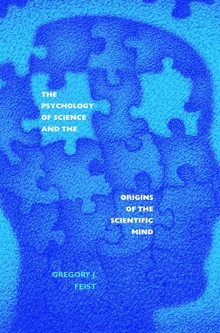The Psychology of Science and the Origins of the Scientific Mind
WARNING
You are viewing an older version of the Yalebooks website. Please visit out new website with more updated information and a better user experience: https://www.yalebooks.com
Gregory J. Feist
In this book, Gregory Feist reviews and consolidates the scattered literatures on the psychology of science, then calls for the establishment of the field as a unique discipline. He offers the most comprehensive perspective yet on how science came to be possible in our species and on the important role of psychological forces in an individual’s development of scientific interest, talent, and creativity. Without a psychological perspective, Feist argues, we cannot fully understand the development of scientific thinking or scientific genius.
The author explores the major subdisciplines within psychology as well as allied areas, including biological neuroscience and developmental, cognitive, personality, and social psychology, to show how each sheds light on how scientific thinking, interest, and talent arise. He assesses which elements of scientific thinking have their origin in evolved mental mechanisms and considers how humans may have developed the highly sophisticated scientific fields we know today. In his fascinating and authoritative book, Feist deals thoughtfully with the mysteries of the human mind and convincingly argues that the creation of the psychology of science as a distinct discipline is essential to deeper understanding of human thought processes.
“The Psychology of Science and the Origins of the Scientific Mind succeeds on many levels. Feist pulls together a vast range of psychological research with clarity and insight, and he advances an intriguing framework for the cognitive origins of scientific thinking. The book makes a strong case for an integrated study of the psychology of science."—David Lagnada, Science
“Feist’s own work on the personality dimensions of scientists is reflected in the overall emphasis given to the issues of who becomes a scientist and how scientific talent can be identified, nurtured and retained. . . . This short review only touches on the many merits of this rich and diverse book.”—Ryan D. Tweney, American Scientist
"Feist argues convincingly for an integrated study of the psychology of science. The writing is entertaining and compelling. The book should be of interest to every psychologist and a very wide audience of educated laypersons."—William James Book Award Prize Committee
"No one has even come close to creating the kind of systematic organization for the field of psychology of science that Feist has."—Robert J. Sternberg, Yale University, editor of Why Smart People Can Be So Stupid
Publication Date: September 9, 2008








